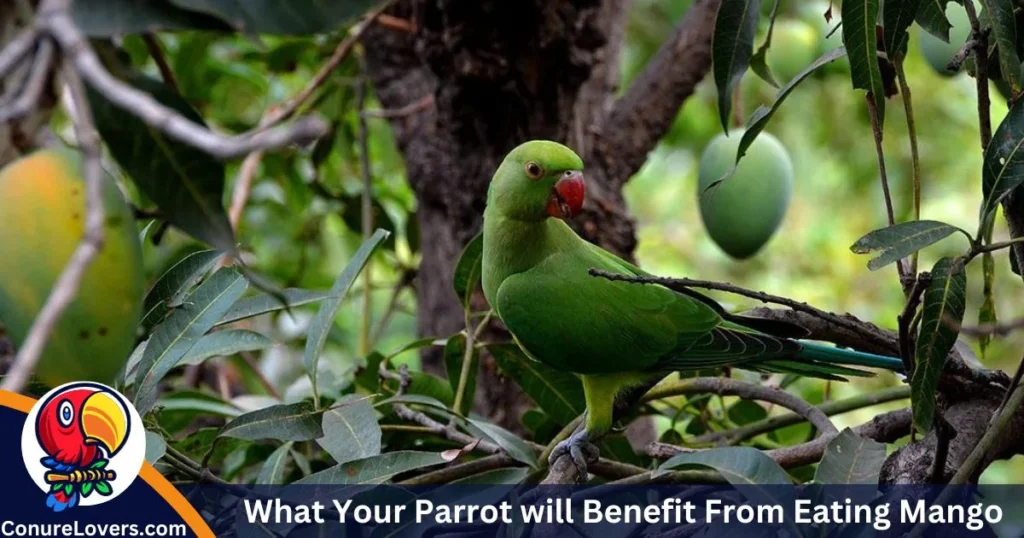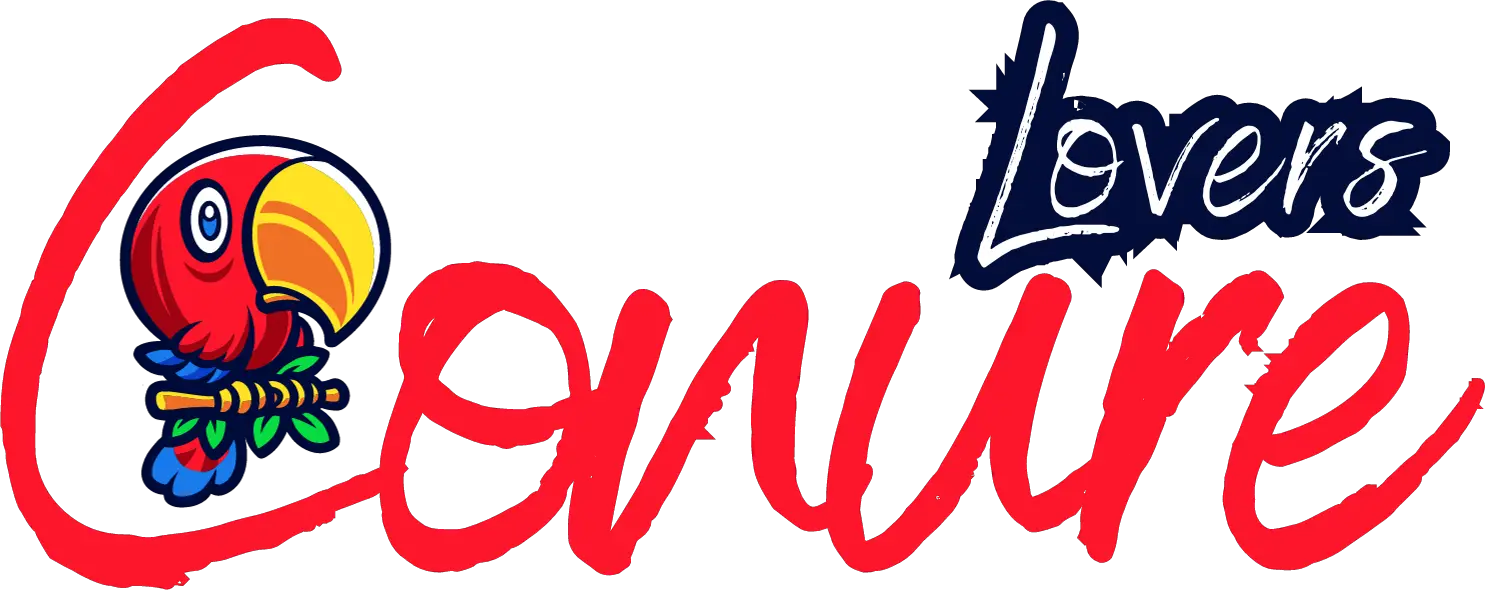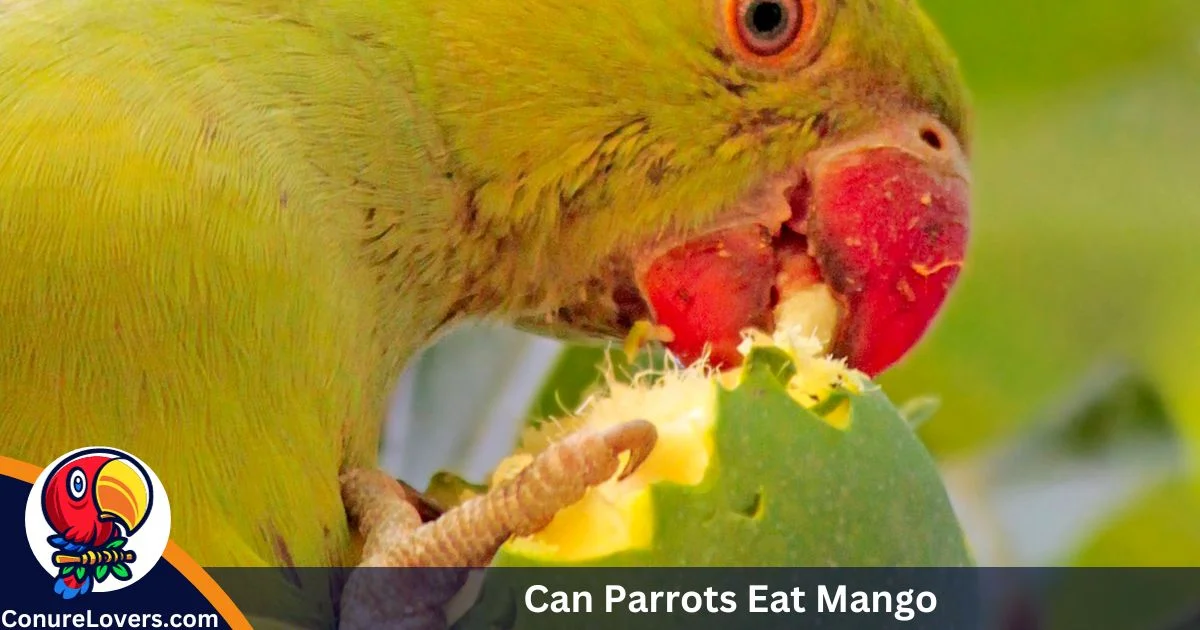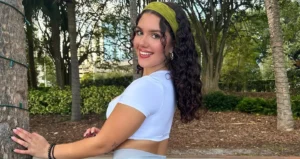Yep, Parrots eat mango because they are healthier. However, canned mangoes can also be okay for them most of the time.
A parrot can eat a small amount of mango every day, like one or two one-inch slices. If you give them more, it’s too much sugar, and that’s not good for them. It’s best to feed them a mix of fruits and veggies, and one piece of mango per day is okay.
Parrots can munch on almost every fruit at the market (except avocado), and mangoes are totally on their safe-to-eat list. Cool, right? So, feel free to treat your feathered friend to some juicy mango goodness!
So, Can parrots eat mango?
Absolutely, parrots can enjoy munching on mango without any worries, as it’s not harmful to them. They’ll likely love the sweetness! But here’s the scoop: mango alone doesn’t cover all the nutrition parrots need, unlike seeds and nuts. So, it’s best to treat them with mangoes occasionally.
Before you slice up those mangoes, it’s smart to get the lowdown on maintaining the right balance in your bird’s diet. Dive into this article to get the full scoop on parrots and mangoes – how much is just right, can they gobble up mango by-products, and the nitty-gritty on the nutrients and perks your parrot gets from mangoes.
What Nutrients Mango contains
Mango packs a punch of essential nutrients, not just for us but for our feathered pals too! According to the US Department of Agriculture (1), every 165 grams of sliced fresh mango brings a nutritional bonanza:
- – Calories: 99
- – Fiber: 2.6 grams
- – Sugar: 23 grams
- – Protein: 1.6 grams
- – Vitamin A: 1785 IU
- – Vitamin C: 60.1 mg
- – Potassium: 277 mg
- – Magnesium: 17 mg
- – Vitamin B-6: 0.2 mg
- – Sodium: 2 mg
- – Fat: 0.6 grams
And that’s not all! Mango also throws in a mix of other goodies like iron, calcium, Vitamin K, folate, zeaxanthin, beta-carotene, and antioxidants. So, whether you’re a human or a parrot, it’s a nutrient fiesta!
What Your Parrot will Benefit From Eating Mango

Mango isn’t just a tasty treat for parrots – it’s a health boost too! Packed with essential nutrients, mango can be a preventive superhero for your feathered friend. However, it’s crucial to note that while mango can contribute to overall well-being, it’s not a cure for serious health issues.
Now, let’s dive into the perks your parrot can enjoy in the long haul by munching on mango:
1. Prophylactic Goodness: Mango’s benefits for parrots lean more towards prevention rather than curing existing health problems.
2. No Miracle Cure: Keep in mind, while mango is a nutritional powerhouse, it won’t magically heal or cure severe health issues in your parrot.
Feeding your parrot mango is like giving them a tasty health boost for the long run!
Better Heart Health
Having a freely flying parrot is truly amazing, and it’s a recommendation for all parrot enthusiasts to train their feathered buddies. Flying is a fantastic natural ability for parrots, and it’s essential not to deprive them of this skill.
However, let’s not underestimate the effort flying takes. It’s no walk in the park for birds! They need a robust cardiovascular system to take off, flap their wings, maintain height and speed, and navigate their flight path before landing where they fancy.
Guess what? Mango comes to the rescue! The presence of magnesium and potassium in mango works wonders in maintaining a healthy pulse and keeping vessels relaxed (2, 3). With these two mineral powerhouses, it’s no surprise that mango can be a great support for your parrot’s heart health. So, let your feathered friend soar high and heart-healthy with a bit of mango delight!
Read Also:9 of The Most Cuddly Parrots Breeds {With Pictures}
Better Immune System
Birds, including parrots, can sometimes pass on diseases to each other. If a bird has a weakened immune system, there’s a chance it might get sick and require veterinary care.
Now, here’s the deal: Vitamin A is crucial for a robust immune system in parrots. It helps them fight off diseases and infections, playing a vital role in boosting immunity. However, many seed diets lack this essential vitamin, putting your parrot at risk of Vitamin A deficiency, which can lead to a slow and painful decline.
Ensure your feathered friend gets enough Vitamin A. Thankfully, mango is a fantastic source of this essential nutrient.
But wait, there’s more! Mango also packs a punch of Vitamin C, known for giving the immune system a good boost. While most parrots can produce this vitamin on their own, the Sun Conure requires an external source like mango to meet its Vitamin C needs.
So, keep your parrot’s immune system strong and thriving with a dose of Vitamin A and C from the delightful mango!
Better Gut Function
When parrots absorb too much water from their food, it can lead to constipation, causing discomfort for our feathered friends. If your parrot is struggling with hard stool, offering mango slices can be a tasty remedy.
Why does it work? The fiber in mango plays a hero’s role by softening the stool and easing constipation. Keep an eye on the shape and frequency of the stool; if the constipation persists, a vet visit might be necessary.
But here’s an interesting twist: Since fibers can absorb water, mango can also come to the rescue in case of diarrhea. It helps solidify the stool and adds some bulk, making it easier to pass.
In a nutshell, mango isn’t just a treat; it’s a digestive superhero! It keeps your parrot’s digestive system healthy, preventing constipation from barging in.
Better Mood
When your parrot indulges in some mango, it can give a fantastic mood boost, especially during molting time. Molting can be a stressful period for parrots, and mango comes in as a delightful stress-buster.
Antioxidant
When your parrot’s body breaks down the food it eats, it produces a molecule called free radicals. These molecules play a vital role in fighting infections and supporting the immune system, not just for us but also for parrots.
However, here’s the catch: when the number of free radicals surpasses the antioxidants in the body, it can lead to oxidative stress. This stress can cause serious health issues, including DNA damage that may result in cancer. Yes, parrots can indeed get cancer.
The good news? Mango comes to the rescue! Packed with a variety of antioxidants, it helps maintain a balance, fights the aging process, and protects cells from damage, benefiting both humans and our feathered friends. So, munch on that mango for a healthy and happy parrot!
Delicious Treat
Just like many people have mango as their favorite fruit, parrots might fancy it too! It could be their top pick among various fruits. To find out, offer your parrot a small slice and observe their reaction. It might just become their go-to fruity delight!
How Much Mango Parrot Can Eat?

Absolutely, mango is a nutrient powerhouse for your parrot, but here’s the catch – it can sneakily lead to weight gain over time. The high-calorie content in mango means you might unknowingly exceed your parrot’s dietary needs, making them a bit plumper than intended.
The trick? Offer small slices and bits of mango occasionally. If you plan to include mango in your parrot’s daily meals, be cautious not to go overboard.
Personally, for my African greys and cockatoos, I don’t make mango a regular feature. I go for random slices spaced out in their diet, always keeping tabs on the portions.
Here’s the crucial part: Know the numbers! Understanding your parrot’s daily calorie needs is vital. For instance, macaws need about 200-220 calories a day for optimal health, while small budgies get by with only 10-15 calories.
However, the calorie calculation game with parrots isn’t straightforward. It’s not just about size or breed; it hinges on factors like activity level, molting, breeding season, and more. The best bet? Consult your vet to nail down the right calorie count for your feathered friend.
Can Parrots Eat Mango Skin?
You’re right on the money! The mango skin is that outer layer we cut through to get to the tasty yellow part. With the increasing demand for agricultural products, farmers and big companies often resort to using insecticides to meet the demand and boost their profits.
Now, when it comes to mangoes, I play it safe. If I’m unsure whether my fruit is organic or not, I prefer not to serve the mango skin to my parrots. Even though the skin is rich in nutrients and parrots would probably love it, the potential presence of pesticides makes me cautious.
Can Parrots Drink Mango Juice?
While most parrots can sip on it, bottled or canned mango juice isn’t the healthiest choice for them. The culprits? Preservatives, other chemicals, and let’s not forget the added sugar in the juice. Now, if we’re talking about homemade organic juice, you’re in the clear!
Can Parrot Eat Dried Mango?
In certain parts of the world, dried mango is a delightful treat enjoyed by people, and guess what? Parrots dig it too! Stick to organic dried mango, though. Avoid the supermarket products claiming to be organic and healthy – often, the reality is the opposite. You can either easily dry the mango yourself or pick up some from a whole food market. Your parrot will thank you for the tasty and wholesome treat!
Can Parrot Eat Mango Seeds?

There are fruits like apples and oranges whose seeds parrots can’t eat due to high toxin levels like cyanide. However, when it comes to mango seeds, they’re safe for parrots, but it’s crucial to exercise moderation. Keep in mind that mango seeds are comparatively larger than those of other fruits. Encased in a protective hard layer, these seeds can be challenging to open. It’s perfectly fine to offer the seed to your parrot while it’s still inside its protective layer – your bird might even find it entertaining to chew and pick at to get to the seed inside.
Conclusion
Absolutely! Parrots can enjoy munching on mango, and it’s safe for them. Mango is a nutrient-packed treat that brings numerous health benefits, from boosting the immune system to aiding digestion. It’s important to offer mango in moderation, considering its calorie content to prevent unintended weight gain. Keep it to occasional slices, and remember, the mango skin may pose risks due to potential pesticides. Homemade organic juice is a better choice than store-bought options with additives. Dried mango is a delightful snack, but opt for organic versions. Surprisingly, parrots can safely nibble on mango seeds, but be mindful of their larger size. In a nutshell, mango can be a tasty and healthy addition to your parrot’s diet, bringing joy and well-being.

I’m Dariel Campbell, your Conure Care Pal from “Conure Lovers.” Join me in creating a cozy and loving home for your conure. I’ll share friendly tips to make your conure care journey a delightful experience!











